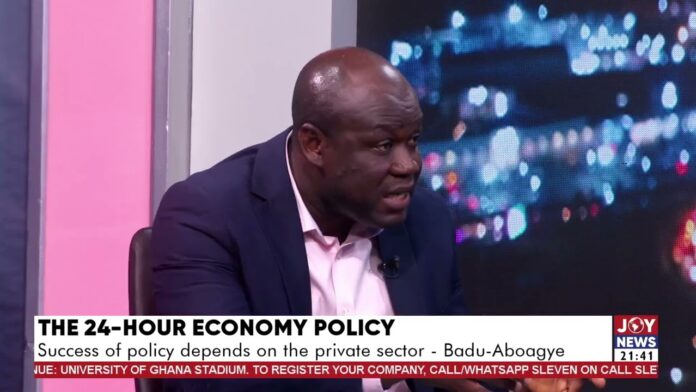The CEO of the Ghana National Chamber of Commerce and Industry (GNCCI) has issued a word of caution to government following the launch of the National Democratic Congress (NDC)’s flagship 24-Hour Economy policy.
Mark Badu-Aboagye stated bluntly that “no one buys products just because it’s from a 24-hour economy.”
Speaking on PM Express on JoyNews, the Chamber boss stressed that without tackling the structural barriers facing Ghanaian businesses, the 24-Hour Economy model may not deliver the transformation it promises.
“Launching a 24-hour economy will not change the harsh business environment that we are facing now,” he said. “The first point for me is to look at how we can improve the business — talking about a harsh business environment.”
Host Kofi Agyei referenced recent macroeconomic improvements such as over 30% appreciation of the cedi, inflation falling to 13.7%, increasing reserves, and renewed business confidence.
But Mr. Badu-Aboagye was not impressed.
“It is a good start, but it’s not enough,” he insisted. “Having inflation down to 13.7% is a necessary condition, but not sufficient to change the structure of the economy.”
He emphasized the need for these macroeconomic gains to translate into tangible benefits for producers.
“We want to see how lower inflation will reduce the cost of credit. We want to see how it will reduce the cost of utility — electricity and water. These are key components when it comes to manufacturing.”
He lamented the high cost of utilities and borrowing in Ghana, which he says undermine the competitiveness of local manufacturers.
“In Ghana, the cost per kilowatt hour per manufacturing company, ranging from 12 to 15 cents, is among the highest. In other countries, it’s less than five cents,” he noted.
“If you have a policy rate of 28%, of course your interest rate will be around 30% and over. No company would want to manufacture and export under these conditions.”
Mr. Badu-Aboagye also questioned the practical focus of the 24-Hour Economy if it is aimed largely at serving the domestic market.
“If it’s for local consumption, then we don’t need a 24-Hour Economy, because we can produce much to feed ourselves,” he explained. “We want to export. That is why accelerated export is a component of the 24-hour economy.”
But, he added, the global market won’t accept uncompetitive products simply because they are made in Ghana.
“When you send your product abroad, people will not buy it because it’s coming from Ghana, because you have launched a 24-hour economy, hm?” he asked. “They will buy your product because one, it’s competitive; two, it’s of high quality.”
With African producers now competing under the AfCFTA, he warned that Ghana must act decisively to reduce production costs.
“You produce and you send it there, and you won’t get people to buy because it’s very expensive.”
He concluded with a call for a stronger link between macroeconomic stability and real benefits for businesses.
“Let’s look at how the improvements we are seeing now — the lower inflation and the cedi appreciation — will impact on the policy rate.”
Source: Abubakar Ibrahim



